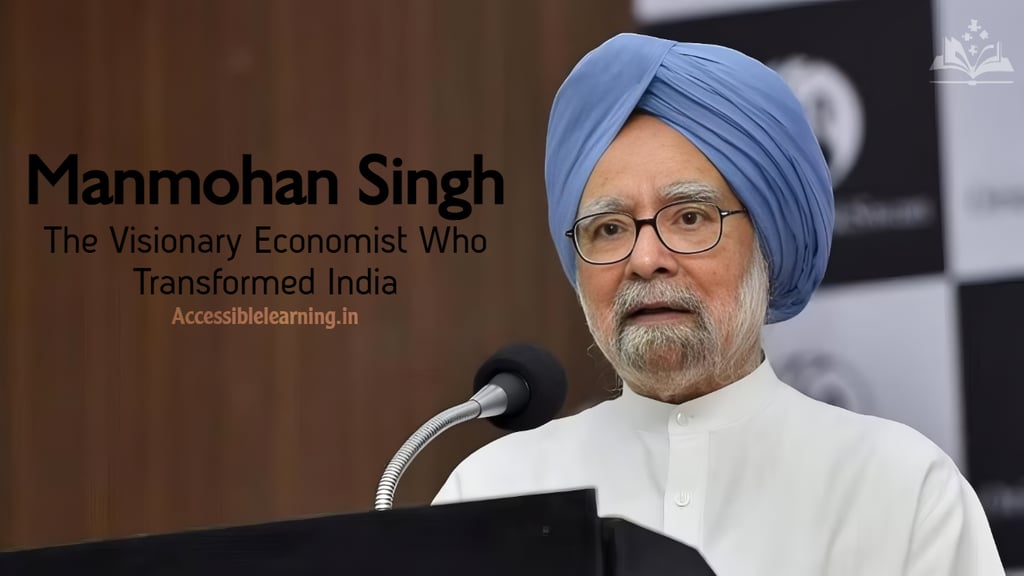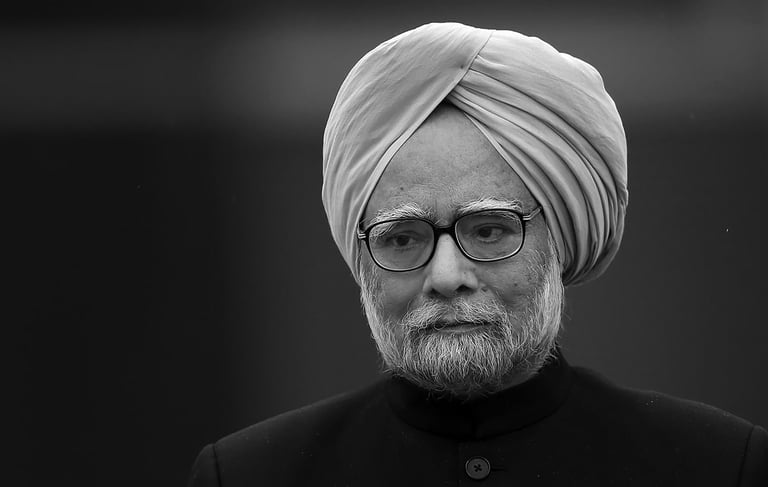
Manmohan Singh Ji: The Visionary Economist Who Transformed India
Explore the inspiring journey of Manmohan Singh Ji, India’s visionary economist and former Prime Minister, whose leadership and reforms transformed India's economy and global stature. Learn about his life, achievements, and enduring legacy.
INDIAN HISTORYBIOGRAPHYTHE GREAT LEADERPOLITICAL JOURNEYMODERN INDIAINC
Sachin K Chaurasiya
12/28/20247 min read


Manmohan Singh Ji (मनमोहन सिंह जी), the 14th Prime Minister of India, remains an enduring figure in Indian politics and economics. Known for his modest demeanor and extraordinary intellect, Singh's contributions have shaped modern India's economic trajectory. This article delves into his life, achievements, and lasting legacy.
Early Life and Education
Born on September 26, 1932, in Gah (now in Pakistan), Manmohan Singh's early years were marked by resilience and ambition. His family migrated to India during the partition in 1947, a traumatic experience that profoundly influenced his worldview.
Singh's academic journey began at Punjab University, where he excelled in economics. He later pursued higher studies at the University of Cambridge and earned his doctorate from the University of Oxford, specializing in trade and development. His scholarly pursuits laid the groundwork for his future contributions to India's economy. At Cambridge, Singh was deeply influenced by the Keynesian economic model, which emphasized government intervention to stabilize economies, an idea that would later play a critical role in his policymaking.
Career as an Economist
Manmohan Singh's professional career began as an academic, but his transition into policymaking marked a turning point. He served as a key figure in various Indian institutions, including:
Chief Economic Advisor (1972–1976): Singh played a pivotal role in shaping India's economic policies during a turbulent global economy.
Governor of the Reserve Bank of India (1982–1985): Under his tenure, Singh emphasized financial stability and modernized banking regulations. He was instrumental in introducing new currency notes and improving India’s monetary policies.
Deputy Chairman of the Planning Commission (1985–1987): He advocated for a balanced approach to development, integrating social welfare with economic growth.
Secretary General of the South Commission (1987–1990): Singh’s work at this international body helped address the developmental challenges of countries in the Global South, further enhancing his global reputation.
Architect of Economic Reforms (1991)
Manmohan Singh Ji's most celebrated achievement came during his tenure as India's Finance Minister under Prime Minister P.V. Narasimha Rao. In 1991, India faced a severe economic crisis, with foreign exchange reserves depleting rapidly.
Singh, in collaboration with Rao, spearheaded a series of liberalization reforms that transformed India's economy. Key measures included:
Dismantling the License Raj: Reducing bureaucratic hurdles for businesses.
Encouraging Foreign Investment: Opening up sectors to international players.
Modernizing Trade Policies: Lowering tariffs and embracing globalization.
These reforms ushered in a new era of economic growth, making India one of the fastest-growing economies globally. Singh’s famous budget speech in 1991, which quoted Victor Hugo, remains iconic: “No power on earth can stop an idea whose time has come.”
Under Singh’s stewardship, India transitioned from a closed, socialist economy to a dynamic, market-driven one. His reforms paved the way for sectors like IT, telecom, and pharmaceuticals to thrive, creating millions of jobs and elevating India’s global stature.


Prime Ministerial Tenure (2004-2014)
Manmohan Singh served as India’s Prime Minister for two consecutive terms, leading the United Progressive Alliance (UPA) coalition. His leadership style, characterized by humility and consensus-building, set him apart.
Economic Growth and Welfare!
During Singh’s tenure, India experienced robust economic growth, with GDP growth rates peaking at 9%. His government introduced landmark social welfare programs, including
Mahatma Gandhi National Rural Employment Guarantee Act (MGNREGA): Aimed at providing rural employment and reducing poverty.
Right to Information Act (RTI): Promoting transparency in governance.
Right to Education Act: Ensuring free and compulsory education for children.
Food Security Act: Providing subsidized food grains to millions of households.
These initiatives reflected Singh’s commitment to inclusive development, addressing both economic growth and social equity.
Infrastructure & Technological Advancement
His government launched several infrastructure projects, such as the Golden Quadrilateral highway project and urban development schemes. Singh’s policies also encouraged investments in renewable energy, aiming to position India as a leader in sustainable development.
Foreign Policy
Singh was a staunch advocate of strengthening India’s global stature. Notable achievements include:
India-US Civil Nuclear Deal: A groundbreaking agreement that ended India’s nuclear isolation and facilitated energy cooperation.
Strengthening ties with neighboring countries like Pakistan and China despite challenges. Singh’s bold attempt to initiate peace talks with Pakistan post-the 2008 Mumbai attacks showcased his diplomatic acumen.
Advocacy for India’s role in global forums like the G20, BRICS, and the UN, reflecting his vision for a multipolar world.
Challenges & Criticism
While Singh’s tenure was marked by success, it was not without challenges. Corruption scandals, such as the 2G spectrum case, the Commonwealth Games controversy, and the coal allocation scandal, marred his government’s reputation. Critics accused him of being a "silent spectator" during these crises. However, his personal integrity remained unquestioned, earning him widespread respect.
Additionally, his leadership faced criticism for policy paralysis during the latter years of his second term, partly due to coalition pressures. Despite these setbacks, Singh’s dignified silence and focus on governance underscored his belief in democratic processes.
Legacy
Manmohan Singh’s legacy is a testament to his unwavering commitment to India’s progress. He is credited with
Laying the foundation for India’s economic liberalization.
Demonstrating that humility and intellect can coexist in politics.
Prioritizing welfare alongside economic growth.
In 2014, Singh stepped down as Prime Minister, leaving behind a mixed yet impactful legacy. His contributions continue to inspire policymakers and economists worldwide. Notably, global leaders, including former US President Barack Obama, have praised Singh’s wisdom and foresight.


Global Recognition and Influence!
Manmohan Singh's influence extended beyond India’s borders. Recognized globally as a visionary economist, his policies and leadership earned him accolades from international leaders and institutions. Singh's ability to navigate complex economic crises, such as the 1991 balance of payments crisis and the 2008 global financial meltdown, showcased his acumen and steady hand during turbulent times.
Prominent leaders, including former U.S. President Barack Obama and British Prime Minister Gordon Brown, have lauded Singh’s intellect and pragmatism. Obama referred to Singh as a man of "uncommon wisdom and decency," while Brown described him as "the father of modern India."
In 2010, Newsweek magazine ranked Singh as one of the top ten world leaders, acknowledging his role in steering India through economic challenges and promoting global cooperation.
India’s Global Economic Integration!
Under Singh's leadership, India actively engaged with global trade and financial institutions, furthering its integration into the world economy. Key highlights include:
Membership in the WTO: Singh’s policies facilitated India’s proactive participation in the World Trade Organization, ensuring that the country’s interests were safeguarded while embracing global trade norms.
FDI Reforms: His tenure saw significant liberalization in foreign direct investment, particularly in sectors like telecommunications, aviation, and retail. These reforms attracted multinational corporations to India, boosting economic growth and employment.
Role in Climate Change Negotiations: Singh represented India at global climate forums, emphasizing the need for equitable solutions that addressed both development and environmental sustainability.
Reforms Beyond Economy
While Singh is often celebrated for his economic reforms, his tenure also witnessed critical institutional changes that strengthened India's democratic framework. The introduction of the Right to Information Act (RTI) empowered citizens to hold the government accountable, marking a watershed moment in India’s governance. Similarly, the National Rural Health Mission (NRHM) sought to address gaps in healthcare delivery, particularly in rural areas, showcasing his focus on holistic development.
A Man of Integrity
Manmohan Singh’s personal integrity has remained one of his most defining traits. Despite the political controversies that surrounded his tenure, Singh’s reputation for honesty and incorruptibility stood firm. His quiet dignity and focus on policy over populism earned him respect across the political spectrum.
In a political landscape often marked by theatrics and hyperbole, Singh’s understated yet resolute approach to leadership remains a model for aspiring leaders. His ability to rise above partisan politics and prioritize the nation’s welfare underscores his statesmanship.
Cultural Depictions & Public Perception!
Manmohan Singh's life and leadership have inspired numerous books, documentaries, and discussions. The film The Accidental Prime Minister (2019), based on a memoir by his former media advisor Sanjaya Baru, offered a dramatized account of his time as Prime Minister. While the film generated mixed reactions, it reignited conversations about Singh’s leadership style and the challenges he faced within a coalition government.
Public perception of Singh has evolved over the years. While his tenure was criticized for certain shortcomings, many now view his contributions with greater appreciation, recognizing the depth of his impact on India’s growth story.
Vision for India’s Future
Even after stepping down as Prime Minister, Manmohan Singh continues to share his vision for India. In his speeches and writings, he emphasizes the importance of inclusive growth, sustainable development, and fostering harmony in a diverse nation. His critique of contemporary economic policies reflects his enduring commitment to India’s progress.
Singh’s belief in the transformative power of education, healthcare, and technology remains a cornerstone of his vision. He often underscores the need for policy continuity, long-term planning, and an unwavering focus on nation-building.


Personal Life
Manmohan Singh is married to Gursharan Kaur, a pillar of strength and support throughout his career. The couple has three daughters: Upinder, Daman, and Amrit. Despite his towering achievements, Singh has remained a private individual, shying away from the limelight and focusing on his work.
Known for his simple lifestyle, Singh’s personal integrity and humility have endeared him to millions. He is often seen as a rare combination of academic brilliance and moral uprightness in Indian politics.
Honors and Recognition
Manmohan Singh has received numerous accolades, including:
Padma Vibhushan (1987): India’s second-highest civilian award.
Honorary degrees from prestigious institutions, including Oxford, Cambridge, and the University of Bologna.
Global recognition as one of the world’s most respected leaders, particularly for his role in navigating India through the 2008 global financial crisis.
Post-Prime Ministerial Years
After stepping down, Manmohan Singh has largely stayed away from active politics, focusing instead on contributing to public discourse through speeches and writings. His memoir, "Changing India," offers insights into his life, decisions, and the challenges he faced as a policymaker.
Manmohan Singh’s journey from a modest village in Punjab to the corridors of power in New Delhi is a story of perseverance, intellect, and vision. His contributions as an economist and leader have indelibly shaped India’s destiny, earning him a place among the nation’s most revered figures. Singh’s life reminds us that true leadership lies in service, humility, and the courage to embrace change.
Subscribe To Our Newsletter
All © Copyright reserved by Accessible-Learning Hub
| Terms & Conditions
Knowledge is power. Learn with Us. 📚


